Growing up watching detective serials and movies, everyone wants to become a detective. The thrill of deducing never really leaves us especially after getting to know the character of Sherlock Holmes. However, we turn this dream into a reality along the way. Since crime rate is increasing these days, more detectives are needed in order to solve them. This is where some police officers step up and exhibit the Sherlock Holmes in them. If becoming a detective someday is a burning desire of yours, the information listed below is a great help.
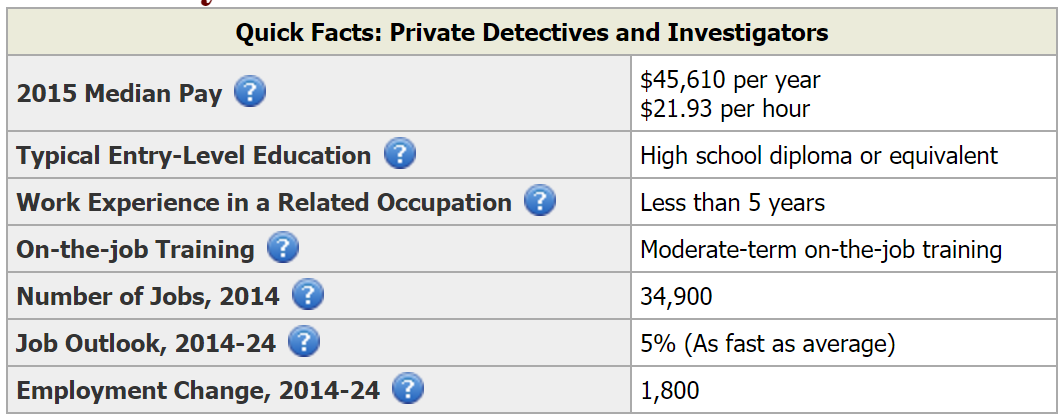

Table Of Contents
- Average Detective Salary
- Detective Career Outlook
- How To Become A Detective
- Detective Job Description
How Much a Detective Earns
The base salary of a detective first depends on his or her employer. An investigator who is employed by the state earns more than a private one in most cases. This is because a private detective has intermittent work while the state employed has a steady work. A state employed detective earns a national average of $76,000. Whereas the average salary for a private detective can be around $45,000. The factors that affect a PI’s salary will be discussed later. Let’s take a look at the factors affecting a state employed investigators’ salary at the moment.
[asd_program_button /]Population Size
Just like police officers, the income of a detective is dependent on the city’s population. The number of cases to be handled by a detective increases if the city is more populated. In this case, the salary will increase. The crime rate also affects the salary of an investigator. For example, the average salary for someone in the LA police department ranges from $44,000 to $88,000. In contrast, for someone in Miami Police department, the average salary tends to be around $86,000 to $107,000.
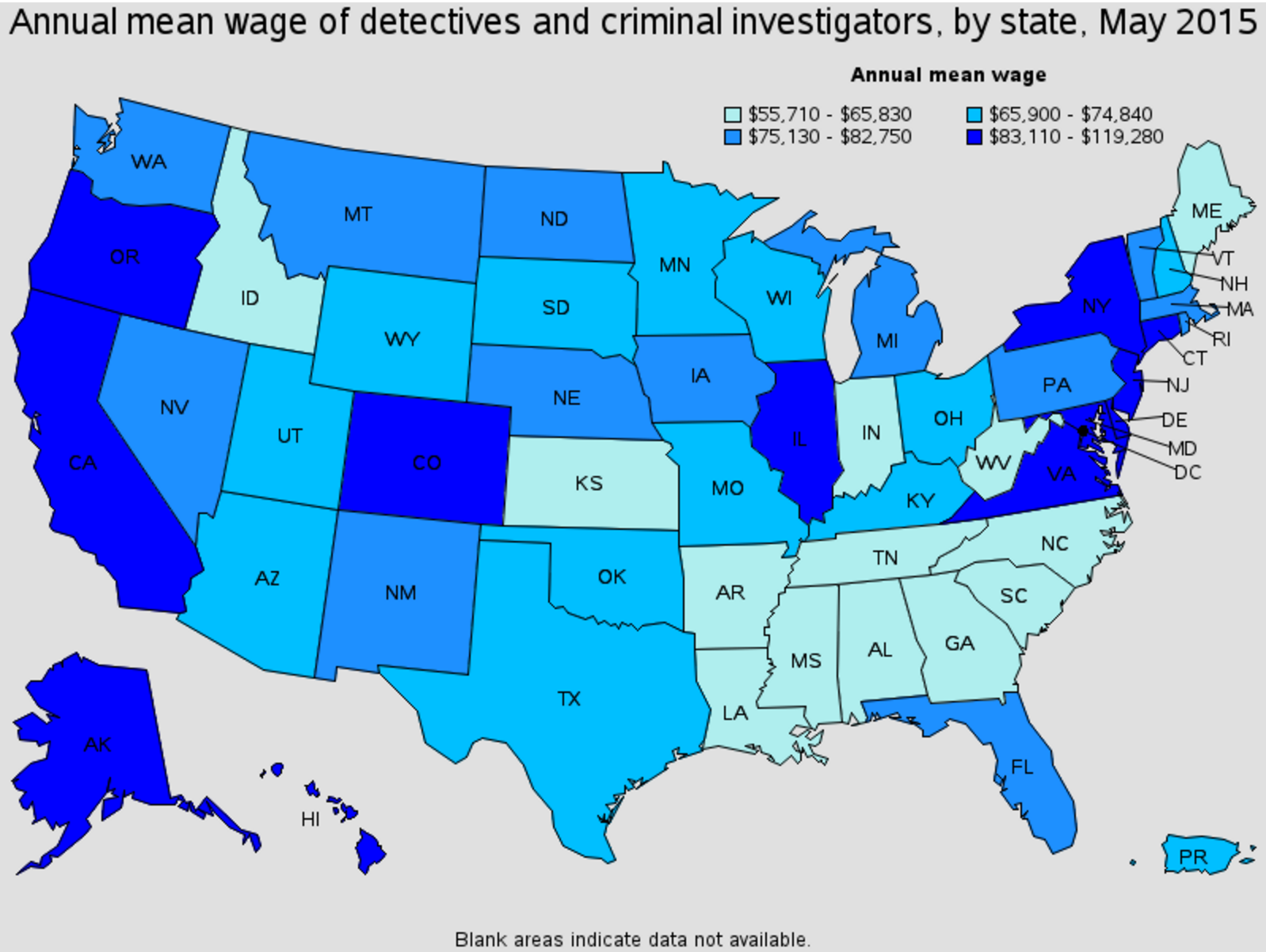
Place assigned or working
The location is just the same us with the population of the place and rate of the crime. But there is another factor, which is the cost of living. A detective will be paid higher if the cost of living in that certain location is higher. This logic agrees with the case of private investigators too. District of Columbia, Alaska, and New Jersey all pay 6-figure salaries with District of Columbia paying as much as $116,000.
Educational degree
One can have a police job if he or she has a high school degree except at the federal level. Though this rules sometimes varies with state, most states do not require higher education certificates. But, the importance of higher education is considered by some states and departments that is why a degree after high school is a factor that affects the salary of the officers and detectives. The degree could be associate, bachelor or master’s. Depending on your degree, you might be paid more.
Experience
You will be paid as an investigator if you will be working in the field for a long period of time. For those who are working in the field for 20 years already even if they are not promoted will get up to $15,000 increase. You can earn about $180,000 annually if you reach the post of Police Chief as a promotion.
Tom Bean Private Investigators
The number of cases and solving them are the bases of a private investigator’s salary. The factors that affect the salary as mentioned above include the location, amount of discretion needed, amount of danger involved, required extra equipment and other many things. Clients usually present their problem to the investigator and then it is up to them to quote a price for the job.
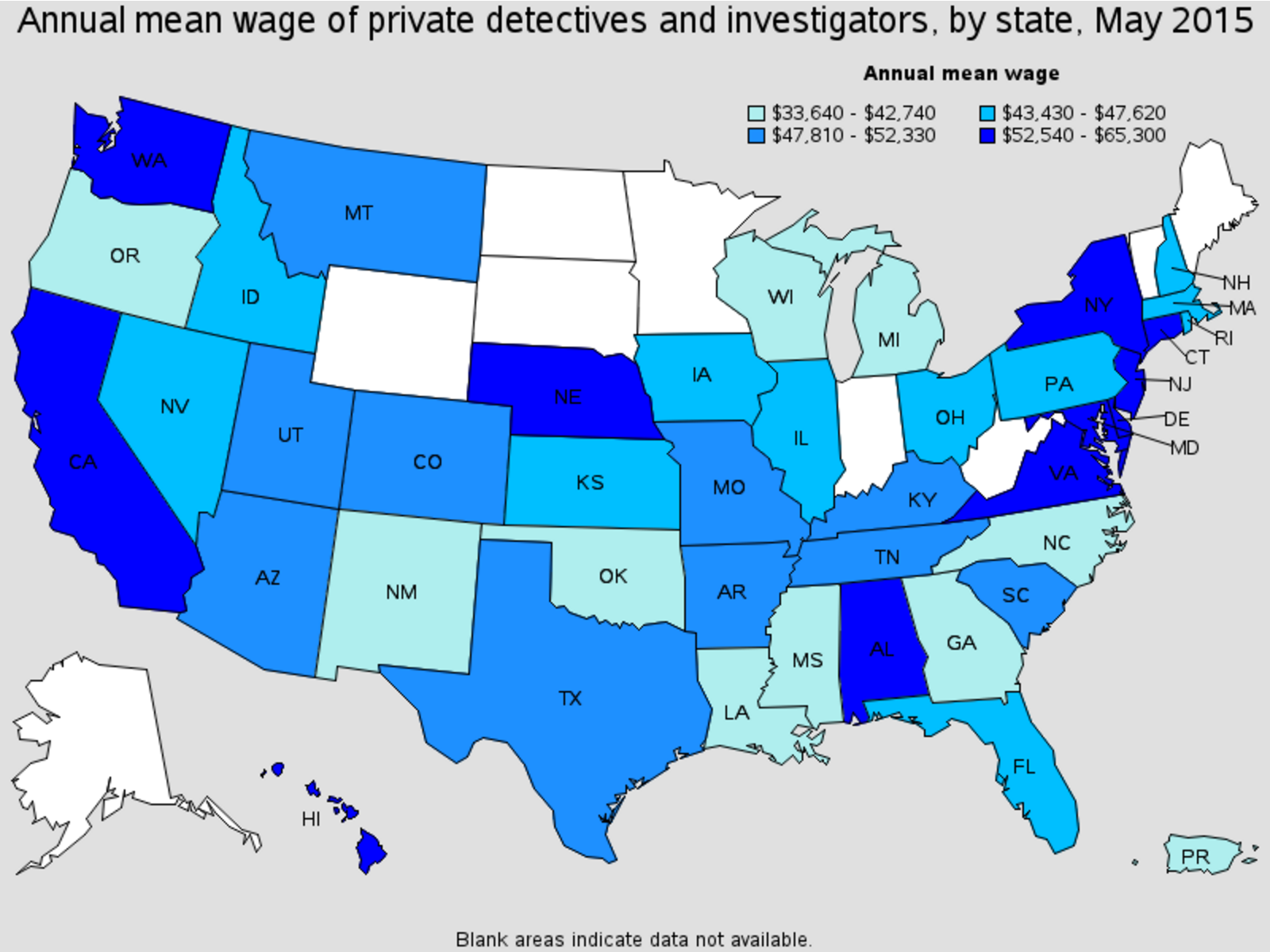
You will know here that a state-employed detective’s income is steady and through various means it can be increased. On the other hand, a private investigator’s salary is quite unpredictable and will only increase if he or she is already popular or known. Now that you have the financial facts, you can decide which path to choose.
Tom Bean Detective’s Career Path
What we are going to talk about first is the growth in the fields. There were about 106,000 public detectives or criminal investigators on record in 2015. Meanwhile, private investigators who do the same job were only 30,000. In this industry, the predicted growth of private detectives is about 15%. Meaning to say, in 2025 the new jobs open will reach 1,500. This is the same growth rate of 5% in different sectors. On the other hand, for public investigators, this figure is at 4%. This goes to show that 4,000 more jobs as a criminal investigator is expected in 2025. This is also considered as the average growth rate.
[asd_program_button /]The employment increases steadily because the population increases. Protection should be done to a lot of people and more criminals should be caught as the population increases. But due to the strict implementation of laws and technology are more advanced, the crime rate is not increasing that much. Hence, there is a balance in each other, which leads to average growth in both careers.
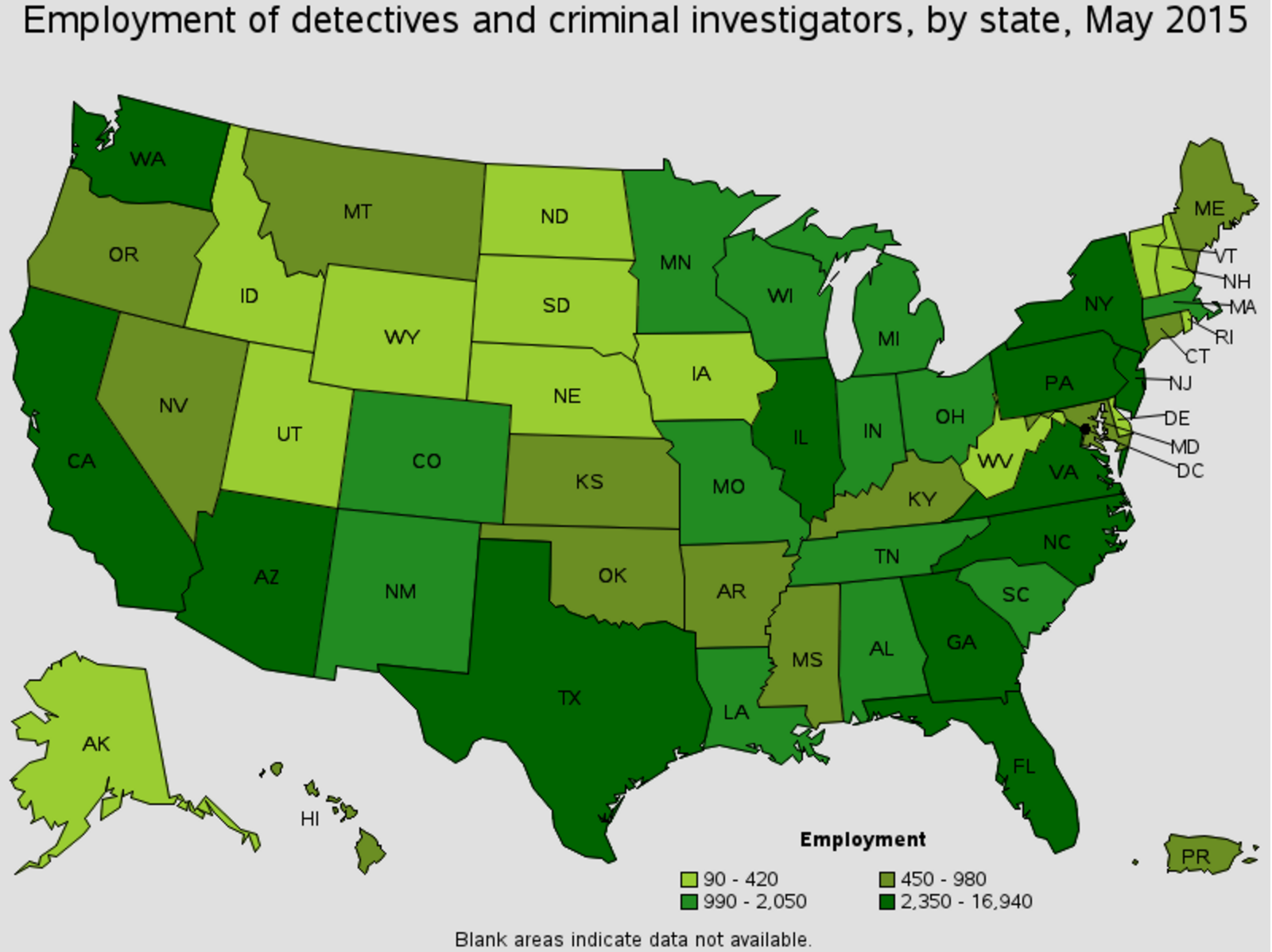
Geographically speaking, Texas, California and New York employ the highest number of Criminal / Law Enforcement Investigators. There are more employments in Western states and Texas compared to the eastern part. Private detectives are prominent in California, Texas and Florida with the southern states tending to employ more compared to the northern ones.
Let’s now find out where these two professionals are hired most by industires. The Local, State government and the Federal branch are employing a lot of criminal investigators. On the other hand, private detectives are usually hired by Security Services, Consulting services and occasionally by the local government for consultation on a few cases.
Financially speaking, criminal investigators do get paid more than private ones. Their annual average salary is $80,000 (Criminal investigators) and that of Private investigators is around $52,000. When you combine the aspects of geography and finance, you see that District of Columbia, Alaska, and New Jersey paid the most (6 figure salaries) for Public investigators. It is in Alabama, Nebraska, and New Jersey were private detectives are paid most.
Private industries that employ most do not pay the highest in comparison with the different industires. In fact, Electromedical, Navigational, Power generation, Metal Product forming and other such industries paid the most for private detectives since they had the most sensitive information to protect. Moving on to Public Investigators, federal agencies, postal services, and educational institutes pay the most.
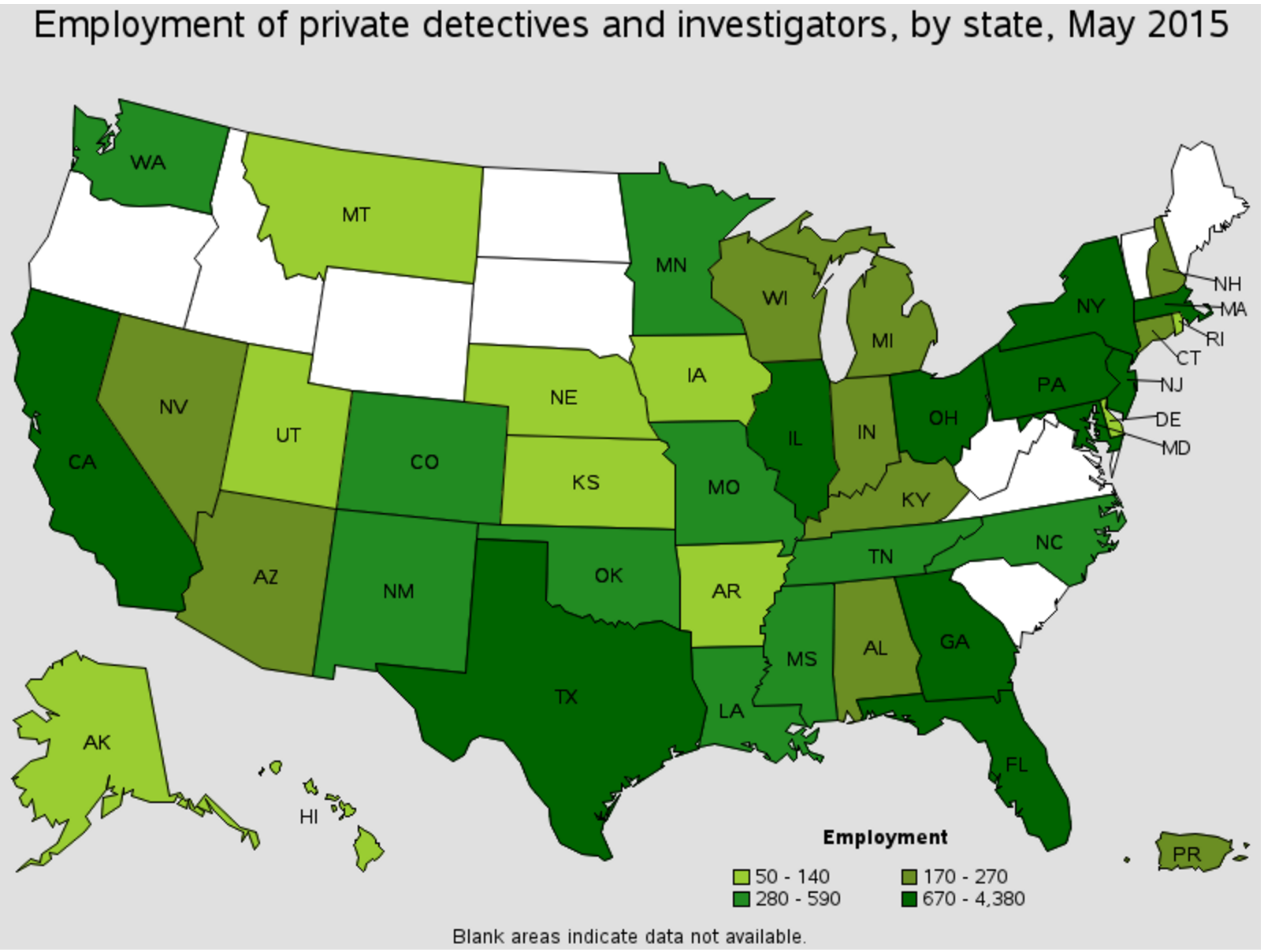
Qualifications to Become a Tom Bean Detective
It is important to note that there are two kinds of detectives. There are private investigators that the general public can hire to investigate on certain things. Some of them are employed by the government and get this post after their promotion as a police officer. We will explore both avenues here.
[asd_program_button /]Finish your High School Studies
Due to excellent deduction skills, a deductive is able to take a leap from a police officer to a detective position. This only means that you will need to complete your high school studies and become a police officer before you can become a detective. To become a private investigator, a high school degree is a must too.
Get your Bachelor’s Degree
A bachelor’s degree isn’t really necessary in most cases when becoming a police officer. However, some police officers prefer to have one as a means of employment after they retire. A bachelor’s degree is also required to pursue any jobs at the federal level or become a detective.
A bachelor’s degree in either criminal justice or law will be required in most institutions to become a detective. A total of 5000 hours of training is given to anyone with an associate’s degree. However, the time required is reduced to 4000 hours if you have a bachelor’s degree.
Gain experience
To become a professional detective (not employed by the state), you need to have some professional experience as an investigator. Fortunately, you have several options available. Getting employed by the government is basically the most common method. If you have any experience as an arson investigator, criminal investigator or a law enforcement investigator, you are qualified as a person with experience. Working as an office investigator or as a licensed repossessor will count as well.
The experience required might vary from one state to another. A state might require at least 3 years of experience, but in some it could be as long as 5 years.
Acquire a license for your guns
Investigators who don’t have a firearms permit are prohibited from carrying their guns. There are several firearms with strict requirements such as completing a full training course before the permits are issued. Hence, to get a permit for your firearm when working as an investigator, you will need to complete the full training course.
Undergo a Texas licensing test
After completing all the education and experience requirements, you are required to undergo a state licensing test. The test will include questions regarded state laws and have multiple choices to choose from. This examination is only for aspiring private detectives. After passing this test, you are officially a private investigator with a license.
Get Texas Insurance
Since investigating can sometimes be a dangerous line of work, it is important to get insurance done. Typically, we’re talking about a $10,000 medical insurance. But since you’re carrying a gun with you for extra protection, and you will have to insure the gun as well, getting a higher amount will be an ideal choice.
Complete all these steps and then voila! Your steps towards becoming a successful detective is finally within your reach. But be careful – as mentioned before, this can be a dangerous line of work. If you want to pursue your dreams, learn all about the requirements and complete them as soon as you can.
Tom Bean Detective Job Description?
Crime Scene Investigation
One main role of a detective is to take a look at a crime scene and make certain deductions. The detectives find and bag evidence at the scene of the crime. They are supposed to take anything into custody that may look suspicious and may be used for clues or in the court later. Sometimes the forensic investigation department lends them a hand in analyzing the evidence and thus helping them deduce more things about the crime. They are also supposed to go door to door and gather more evidence from eye witnesses or search for cameras wherever they might be installed.
[asd_program_button /]Criminal Research
Doing research regarding previous cases is regarded as an important aspect of a detective’s job. This is so that they can have an insight regarding criminal patterns and behaviors. This involves looking into previous case records to allow them to have an insight regarding the behavior of the criminal. In cases of serial killers or ‘copycats’, research helps a lot. This also helps detectives take down drug cartels by allowing them to identify any tactics being used. Through the help of general research, it will be a lot easier for detectives to identify the culprit or make any accurate deductions.
Reducing the list of possible suspects
A detective’s main objective is to take the one at fault to justice. They will need to have a list of the suspects first before such thing could happen. This suspect pool maybe as big as 100 people or as small as none. They create this suspect list by drawing conclusions from the evidence gathered at the crime, eyewitnesses, research and a bit of criminal/forensic psychology. The list will then be narrowed down by interrogating suspects one after another. With a narrowed down list, they will then have the suspects admit to their crimes.
Testifying In Court
Lastly, detectives will see to it that justice is served properly. To hasten the process, the court will sometimes summon them. In some cases, they will describe the evidence and how they are connected to the suspect, as well as narrating the possible crime scene. There are also cases where the one at fault will be escorted by the detective.
Tom Bean Private Detectives
Basically, the above mentioned roles are the responsibilities that detectives carry. Keep in mind that the job of a private detective isn’t as easy as it seems. They are supposed to carry out their client’s wishes to the best of their abilities as far as reconnaissance is concerned. But there are limits which they shouldn’t go beyond when carrying out their duties. Private detectives are often hired for tasks such as gathering evidence from someone, monitoring certain individuals, or even tracking finances. They should never act in a way that they can be easily recognized as a detective in public. Detectives are also prohibited from arresting an individual.
You see, the “Idiot Box However, the roles and responsibilities that detectives carry aren’t as easy as they seem. Such things aren’t even shown on the TV. Detectives should make sure to find any clue they could get since a lot of people’s lives lie on them. If you’re really interested with the job, you should start knowing what it takes to be a detective now!
